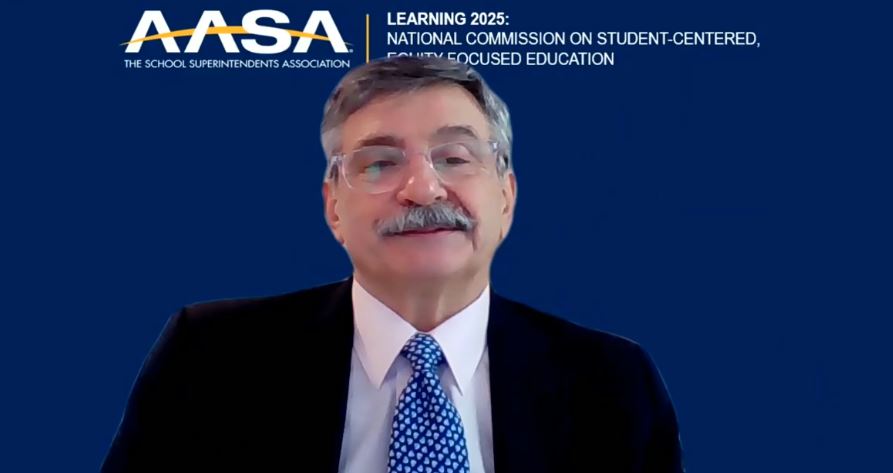By Jacqueline Hyman |
AASA’s National Commission on Student-Centered, Equity-Focused Education presented its desired outcomes for the first time in front of a national audience to attendees of the 2021 National Conference on Education on Thursday, Feb. 18.
The Learning 2025 Commission’s leaders, Bill Daggett, Ray McNulty and Mort Sherman, discussed the goals and recommendations contained in the commission’s draft report. Among the bolder proposals is moving from the proficiency model to the growth model in K-12 education. The group also seeks a firm commitment to address social-emotional learning needs, to mitigate learning loss and to increase the use of new technologies.
“Everything we do has to rest on a foundation that we need to love and embrace every child,” said Daggett, founder of the International Center for Leadership in Education, during the conference session. “We can no longer allow any child in this country to be marginalized.”
The commission, which had its first official meeting Jan. 14, is made up of co-chairs Daggett and AASA Executive Director Daniel Domenech, facilitators McNulty and Sherman, 27 commissioners ranging from superintendents to education organization leaders, and multiple support staff.
Domenech, when establishing the body, said he sought to fundamentally change the education system, not return to the way things worked pre-pandemic. The changing landscape of education due to the coronavirus pandemic and the national reckoning against racism brought on by George Floyd’s death in March 2020 have inspired the National Commission to push for transformation.
“A lot is going on. We need to take control,” said Ray McNulty, president of the Successful Practices Network and National Dropout Prevention Center. “We need to begin to put out there on paper, to be judged on, a set of principles that we believe will be the driving factors for education.”
However, McNulty said, the commission also recognizes the obstacles school leaders may face in implementing change, such as rules and regulations, funding limitations and the implications of this work.
Also participating in the conference presentation were two superintendents from the commission’s demonstration districts: Gladys Cruz, of Questar III BOCES in Castleton, N.Y. and Michael Conner, in Middletown, Conn. These districts have begun doing the type of work the commission seeks.
In her work with BOCES, Cruz’s district has created Tech Valley High School, a small high school with 133 students from 30 districts. The school focuses on equity and student-centered education, with project-based learning at its forefront, Cruz said. Most students do about 100 presentations over four years, ensuring their comfort with public speaking and other communication skills.


The students co-develop assessments with business partners whose projects they build – the idea of students being the “co-author of their own learning journey” is one the National Commission values. Additionally, students at Tech Valley High School receive grades on what Cruz calls “essential skills” such as collaboration, teamwork and communication.
Conner discussed the opportunity the pandemic has given educators to reimagine schooling. His district has been focused on improving equity.
“This is a very motivational time. We have to get students back into school,” Conner said. “We have to continue to evolve this learning model, and then we have to continue to evolve what the equity work looks like.”
The demonstration districts will network and share best practices at each year’s AASA national conference over the next four years. Ultimately, Learning 2025 hopes to create a set of steps to measure the efficacy of education systems in the next few years.
Conner added, “The work of commission has motivated me, invigorated me … to be able to make changes.”
Sherman, an AASA associate director, said the commission’s recommendations “will lead to demonstration sites as this report is intended to lead to action, not be just another great piece of writing that gathers dust.”
(Jacqueline Hyman is a senior reporter for Conference Daily Online and senior editorial assistant with AASA’s School Administrator magazine.)

